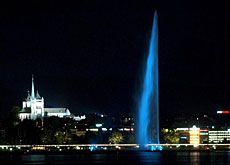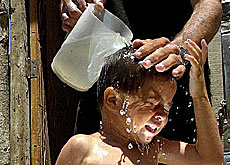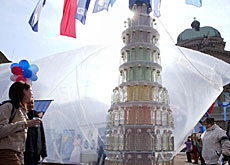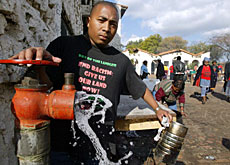Science stars at Geneva fair

The importance and wonder of water are being explored at the fourth annual Night of Science in Geneva this weekend.
Staged on the shores of Lake Geneva, the event aims to unravel the mysteries of science through easy-to-understand experiments and artistic displays.
It was established in 2000 by Geneva’s Science History Museum in an effort to get both children and adults excited about subjects such as chemistry and physics.
“Our goal is to bring scientists to the people and to make science more popular and less daunting,” Eve Hopkins, the event’s spokeswoman, told swissinfo.
“How many people actually go to a geologist’s lab or spend time speaking to chemists? It’s not something we generally do as a cultural pastime, which is why this event works so well,” she added.
Over the past few years, attendance has grown from around 10,000 visitors to an expected 30,000 this year.
“The Night of Science has really become an institution in Geneva, and it’s incredible to see how many people love science… it’s magic,” said Hopkins.
Water everywhere
To coincide with the United Nations International Year of Freshwater, the organisers of the Night of Science decided to focus this year’s event on water.
More than 90 water-related activities – involving some 400 scientists and artists – have been programmed for the fair, which spans from midday to midnight on both Saturday and Sunday.
The diverse line-up includes water polo matches, water tasting, human fountains and underwater music.
Many of the stands and demonstrations at this year’s event have been designed to encourage visitors to explore and discover the mysteries of water, from the oceans’ deepest depths to water trapped in 30 million-year-old rocks.
A lakeside exhibit, based on Jules Verne’s novel, “20,000 Leagues Under the Sea”, invites children to take an imaginary voyage to the bottom of the sea; while just a few metres away, adventurous adults can go scuba diving in Lake Geneva.
Meanwhile, those who prefer to keep their feet dry can choose to take a ride on one of six discovery boats, including steam and charcoal-powered vessels.
Water-tasting experts will also be on hand to teach visitors how to tell the difference between various kinds of water.
“We’re offering water from many parts of Europe including Sweden, Norway, England, Scotland, France, Austria, Germany and Switzerland,” explained Hopkins.
Art and science
For the first time, the organisers have also invited artists, including film-makers, dancers and musicians, to take part in this year’s event.
The popular Swiss band, Young Gods, have used cutting-edge technology to create water-based instruments, which they will play at two concerts over the weekend.
At another stand, a scientist will sit in a bathtub while telling visitors about the life of the ancient Greek mathematician, Archimedes, whose most famous principle gives the weight of a body immersed in a liquid.
“It can be hard to get the scientists out of their labs and into the public eye,” coordinator Béatrice Pellegrini told swissinfo. “But they always come back for more because they discover something new, which is that people are truly interested in their work.”
Besides the fun and games, there is also a serious side to this year’s Night of Science, which wants to get visitors to stop and think about the importance of water.
Vital resource
This natural resource makes up 70 per cent of the human body and covers 71 per cent of the Earth’s surface, but is in short supply in many parts of the world.
Around the globe, it is estimated that some 1.2 billion people lack proper access to drinking water, while 2.4 billion are unable to treat water so that it can be consumed safely. As a result, an estimated four million people die each year.
The International Committee of the Red Cross is setting up a mobile treatment facility that will allow visitors to drink water from the lake.
The Geneva-based organisation is using a similar process to provide emergency relief supplies to the people of Iraq.
At another exhibition, the University of Geneva has set up a giant aquarium to show the effects of pollutants on the fragile ecosystems of rivers and lakes.
According to the organisers, visitors to the Night of Science “will never look at water the same way again”.
swissinfo, Anna Nelson in Geneva
The world’s population consumes about 5,500 billion cubic metres of fresh water every year – that’s 62,000 times the volume of Lake Geneva.
In 50 year’s time, this figure is set to grow by a factor of seven.
On average, an African consumes about 18 cubic metres of water per year; a western European consumes four times that amount, and an American ten times.
Worldwide, some 1.2 billion people lack proper access to drinking water.

In compliance with the JTI standards
More: SWI swissinfo.ch certified by the Journalism Trust Initiative



You can find an overview of ongoing debates with our journalists here . Please join us!
If you want to start a conversation about a topic raised in this article or want to report factual errors, email us at english@swissinfo.ch.